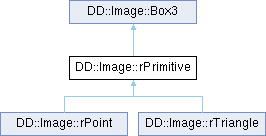This is the base class of anything renderable! We use this class to handle renderable objects that can have simple geometry such as triangles, spheres, etc.
More...
|
|
virtual const char * | Class () |
| |
|
| rPrimitive (const GeoInfo *info, const Primitive *p) |
| |
| | rPrimitive (const rPrimitive &) |
| |
| virtual | ~rPrimitive () |
| |
|
virtual rPrimitive * | duplicate () const |
| |
|
const GeoInfo * | geoinfo () const |
| |
|
const Primitive * | parent () const |
| |
|
bool | cast_shadows () const |
| |
|
bool | receive_shadows () const |
| |
| virtual bool | add_to_render (Scene *, PrimitiveContext *)=0 |
| |
| virtual bool | add_to_displacement_render (Scene *, PrimitiveContext *) |
| |
| virtual bool | intersect (float x, float y) const =0 |
| |
| virtual bool | intersect (float x, float y, float *dist) const =0 |
| |
| virtual bool | intersect_dist_squared (float x, float y, float *dist_squared) const =0 |
| |
| virtual bool | intersect_scanline (float y, int &X, int &R, VArray &v0, VArray &du, VArray &dv) const =0 |
| |
| virtual float | trace (Scene *)=0 |
| |
| virtual float | distance (float x, float y) const =0 |
| |
| virtual float | distance_squared (float x, float y) const =0 |
| |
|
virtual void | subdivide (std::vector< rPrimitive * > &primitives, SubdivisionContext *stx) |
| |
| virtual rPrimitiveType | getPrimitiveType () const |
| |
|
void * | operator new (size_t size) |
| |
|
void | operator delete (void *mem) |
| |
|
void * | operator new[] (size_t size) |
| |
|
void | operator delete[] (void *mem) |
| |
|
| Box3 (float x, float y, float z) |
| |
|
| Box3 (const Vector3 p) |
| |
|
| Box3 (const Vector3 p1, const Vector3 p2) |
| |
|
const Vector3 & | min () const |
| |
|
const Vector3 & | max () const |
| |
|
float | x () const |
| |
|
float | y () const |
| |
|
float | n () const |
| | near, min z
|
| |
|
float | r () const |
| | right, max x
|
| |
|
float | t () const |
| | top, max y
|
| |
|
float | f () const |
| | far, max z
|
| |
|
float | w () const |
| | width
|
| |
|
float | h () const |
| | height
|
| |
|
float | d () const |
| | depth
|
| |
|
Vector3 | center () const |
| |
|
float | radius () const |
| |
|
void | set (float x, float y, float z, float r, float t, float f) |
| |
|
void | set (Vector3 p1, Vector3 p2) |
| |
|
void | set (const Box3 &v) |
| |
|
void | set_min (float x, float y, float z) |
| |
|
void | set_max (float x, float y, float z) |
| |
| bool | empty () const |
| |
|
void | clear () |
| |
| bool | inside (const Vector3 &p) const |
| |
| void | expand (const Box3 &v) |
| |
| void | expand (const Vector3 &p) |
| |
|
void | intersect (const Box3 &v) |
| |
| void | transform (const Matrix4 &m) |
| |
| void | project (const Matrix4 &m, Box &bbox) const |
| |
|
void | append (Hash &h) const |
| |
|
void | print_info (const char *title=nullptr) const |
| |
This is the base class of anything renderable! We use this class to handle renderable objects that can have simple geometry such as triangles, spheres, etc.
Rendering primitive parent class. These objects are usually created by a 'Primitive' subclass when rendering is done. The primary difference between two classes is that the 'Primitive' always remains in scene space, or world space, and a rPrimitive is allocated per render sample and transformed into clip and screen space. These objects are destroyed after rendering is complete.
Clip this primitive, transform it to screen space, and add it to the list of primitives to render in the Scene.
The return value is true if this was added to the list. Originally this was used to indicate clipping. However implementations are now allowed to create other rPrimitive instances and add them to the list (for clipping into multiple pieces). If false is returned, this is immediately deleted. If true is returned it is assumed that destroying the Scene list will delete the primitive.
Implemented in DD::Image::rPoint, and DD::Image::rTriangle.
Referenced by DD::Image::Scene::add_render_primitive().

 Public Member Functions inherited from DD::Image::Box3
Public Member Functions inherited from DD::Image::Box3